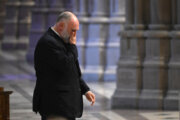KARIN LAUB
Associated Press
RAMALLAH, West Bank (AP) — President Mahmoud Abbas says a “black page” of Palestinian history has been turned with the formation of a unity government that formally ends his seven-year rift with the Islamic militant group Hamas. But the alliance of old foes remains volatile, Israel is threatening punitive measures and Abbas will have to secure U.S. and European recognition and funding to keep the unity government afloat. Here’s a look at what’s next.
TIMELINE
On Monday, Abbas swore in a 17-member Cabinet made up technocrats backed by Hamas and his Fatah movement. The Cabinet replaces two rival governments, one run by Hamas in the Gaza Strip after it seized the territory from Abbas in 2007 and the other, controlled by Abbas, in autonomous areas of the West Bank.
Abbas presided over the first Cabinet meeting at his West Bank headquarters. Three new ministers from Gaza didn’t attend because of Israeli travel restrictions between the two territories. Abbas suggested he will visit Gaza soon, a first since 2007.
Next month, the Palestinian parliament will resume operations. The parliament was elected with a large Hamas majority in 2006 but became defunct after the political split. Meanwhile, the Cabinet is to prepare for presidential and parliament elections in 2015.
RECOGNITION
Israel says it will shun the new government because it is backed by Hamas, which is seen by the West as a terror group because it killed hundreds of Israelis in attacks over the years. Abbas says his new Cabinet has accepted three conditions set out in the past by the U.S. and Europe for dealing with any Palestinian government — recognizing Israel, renouncing violence and adhering to previous agreements.
The Obama administration said Monday it intends to work with the new Palestinian government and will continue sending aid. Secretary of State John Kerry called Israeli Prime Minister Benjamin Netanyahu to relay the U.S. position.
The European Union has said it welcomes unity and will maintain support for a government that meets the three conditions.
FUNDING
The U.S. and the EU have provided hundreds of millions of dollars a year in aid to Abbas’ Palestinian Authority, in addition to funds from other donors, including Arab governments. The Palestinian Authority has faced repeated deficits in recent years, amid donor fatigue and an economic downturn linked to Israeli restrictions on trade and movement. Abbas needs even more aid money now because of the higher costs of blending two separate bureaucracies that together employ some 200,000 Palestinians. A senior Palestinian official, speaking on condition of anonymity because he was not authorized to discuss behind-the-scenes contacts, said the Gulf state of Qatar has assured Abbas it would cover any shortfall. Without U.S. and European funding, such a deficit could be significant.
ISRAEL’S RESPONSE
Despite tough rhetoric, Israel has so far hedged its bets. Israel announced Monday it will not negotiate with a Hamas-backed government. That looks like an empty threat since U.S.-brokered negotiations between Israel and Abbas on the terms of Palestinian statehood broke down in late April, and prospects for their resumption are slim. Israel could freeze the crucial monthly transfer of some $100 million in taxes and customs it collects on behalf of the Palestinians and has done so previously. However, Israel relented in the past because of international pressure and because it has no interest in bringing down a Palestinian self-rule government. In such a case, Israel as the military occupier would have to assume responsibility for some 4.4 million Palestinians.
HAMAS GAINS/LOSSES
Hamas entered reconciliation negotiations as the weaker party. It had to forge the alliance with Abbas because it could no longer afford to govern Gaza. A punishing Egyptian border blockade of the territory over the past year, along with Israel’s continued access restrictions, pushed Hamas into a financial crisis.
As a result, Hamas made concessions. Most of the 17 Cabinet ministers, while nominally independent, are loyal to Abbas or leftist factions. At the same time, Hamas will regain some political power with the reactivation of the parliament next month. Hamas also remains in control of a large security apparatus in Gaza and thus the de facto power.
ABBAS GAINS/LOSSES
In regaining a foothold in Gaza, Abbas is removing a stain from his legacy — the loss of Gaza. The pursuit of unity also gives him a new political strategy after negotiations with Israel failed. He scored an ideological victory over Hamas, which is forced to accept a government is based on his political program.
In return, Abbas leaves Hamas’ military arsenal and fighting force untouched and takes on the burden of procuring funds for providing services to Gaza’s 1.7 million people. Israel has warned that it will hold Abbas responsible for any rocket fire or other attacks launched from Gaza, meaning Abbas has to rely on Hamas to prevent smaller militant groups from carrying out such attacks.
Abbas risks an escalation of tensions with Israel, something he tried to avoid in the past. He has warned he would respond to any Israeli punitive measures, though he has not said what he would do.
LIKELIHOOD OF PALESTINIAN ELECTIONS NEXT YEAR
Neither Abbas nor Hamas seem interested in a vote that could diminish their power and influence in their respective territories. Israel warned Monday that it would act “against the participation of terror groups in elections,” suggesting it would not allow Hamas to campaign in the West Bank and east Jerusalem, areas under full Israeli control.
FUTURE OF WEST BANK SECURITY COORDINATION
It is likely to continue. Abbas says it’s in the Palestinian interest to have his forces continue coordination with Israeli troops in the West Bank. Their shared targets are Palestinian militants, including those from Hamas. Continued security coordination allays Israeli and U.S. concerns about a new Palestinian uprising and protects Abbas against any attempts by Hamas to stage a coup against him in the West Bank.
___
Associated Press writers Mohammed Daraghmeh in Ramallah, West Bank and Ibrahim Barzak in Gaza City, Gaza Strip contributed to this report.
Copyright 2014 The Associated Press. All rights reserved. This material may not be published, broadcast, rewritten or redistributed.







